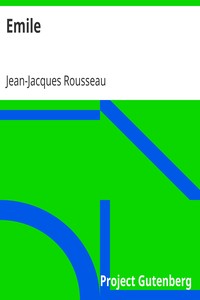Emile by Jean-Jacques Rousseau
"Emile" by Jean-Jacques Rousseau is a treatise written in 1762 on education and human nature. Through the story of a boy named Emile and his tutor, Rousseau explores how individuals can preserve their natural goodness while living in corrupt society. The work presents a radical educational philosophy emphasizing physical development, sensory learning, and emotional growth across five books. Banned and burned upon publication for its controversial religious views, it later inspired revolutionary
educational reforms in France and America. (This is an automatically generated summary.)
Read or download for free
| How to read | Url | Size | |||
|---|---|---|---|---|---|
| Read now! | https://www.gutenberg.org/ebooks/5427.html.images | 1.5 MB | |||
| EPUB3 (E-readers incl. Send-to-Kindle) | https://www.gutenberg.org/ebooks/5427.epub3.images | 598 kB | |||
| EPUB (older E-readers) | https://www.gutenberg.org/ebooks/5427.epub.images | 621 kB | |||
| Kindle | https://www.gutenberg.org/ebooks/5427.kf8.images | 965 kB | |||
| older Kindles | https://www.gutenberg.org/ebooks/5427.kindle.images | 912 kB | |||
| Plain Text UTF-8 | https://www.gutenberg.org/ebooks/5427.txt.utf-8 | 1.3 MB | |||
| Download HTML (zip) | https://www.gutenberg.org/cache/epub/5427/pg5427-h.zip | 585 kB | |||
| There may be more files related to this item. | |||||
Similar Books
About this eBook
| Author | Rousseau, Jean-Jacques, 1712-1778 |
|---|---|
| Title | Emile |
| Note | Wikipedia page about this book: en.wikipedia.org/wiki/Emile,_or_On_Education |
| Credits |
Etext Produced by Steve Harris, Charles Franks and the Online Distributed Proofreading Team. HTML file produced by David Widger |
| Reading Level | Reading ease score: 70.8 (7th grade). Fairly easy to read. |
| Language | English |
| LoC Class | LB: Education: Theory and practice of education |
| Subject | Education -- Early works to 1800 |
| Category | Text |
| EBook-No. | 5427 |
| Release Date | Apr 1, 2004 |
| Most Recently Updated | Sep 15, 2019 |
| Copyright Status | Public domain in the USA. |
| Downloads | 2921 downloads in the last 30 days. |
| Project Gutenberg eBooks are always free! | |

